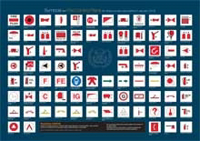The International Code for Application of Fire Test Procedures, (2010 FTP Code) was developed with the aim to enhance user friendliness, ensure more uniform application of the requirements on fire testing and generalize the experience gained so far from the application of resolution MSC.61(67). Bearing in mind the intent of developers to formulate the requirements for fire test procedures in a form which would be as close to general industry’s procedures as possible, one of the aims of the Code was to update references to all ISO applicable standards.
The present Code contains requirements for the testing process itself: testing laboratories, format of test reports, and provides procedures of type and case-by-case approval of materials, components and structures intended for maritime applications. Taking due account of alternative designs and arrangements which have been made possible by virtue of SOLAS regulation II-2/17, adopted by resolution MSC.99(73) in 2000, the Code also provides for the possibility of conducting alternative tests on a proviso that the level of safety of the tested materials, components and structures set by the Convention is not compromised and corresponds to at least that contained in its prescriptive requirements.
The 2010 FTP Code, along with relevant SOLAS amendments to make it mandatory, was adopted, with an expected entry into force date of 1 July 2012.
The 2010 FTP Code provides the international requirements for laboratory testing, type-approval and fire test procedures for products referenced under SOLAS chapter II-2. It comprehensively revises and updates the current Code, adopted by the MSC in 1996.
The 2010 FTP Code includes the following: test for non-combustibility; test for smoke and toxicity; test for "A", "B" and "F" class divisions; test for fire door control systems; test for surface flammability (surface materials and primary deck coverings); test for vertically supported textiles and films; test for upholstered furniture; test for bedding components; test for fire-restricting materials for high-speed
craft; and test for fire-resisting divisions of high-speed craft.





























